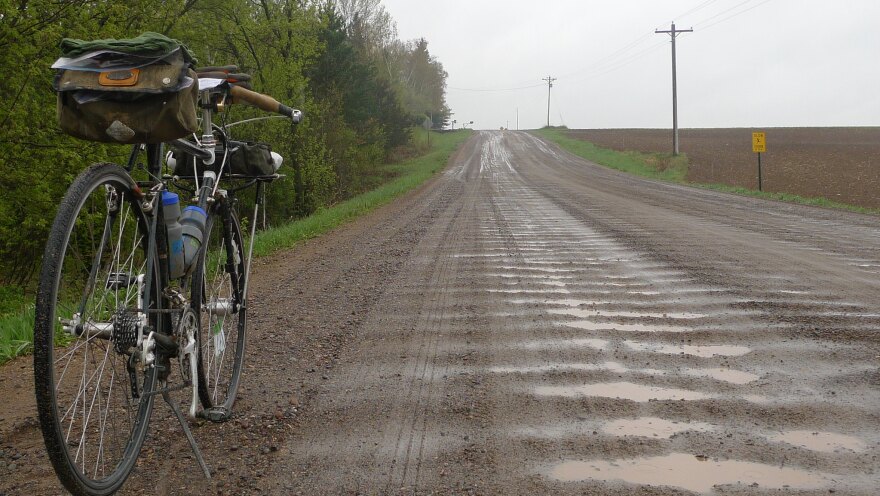Every other Friday on Morning Edition NHPR’s Sam Evans-Brown tracks down answers to questions about the environment and outdoors for our listeners in a segment we call “Ask Sam."
Sheila from Greenfield Asks: "What makes a washboard? For decades I’ve driven over New Hampshire dirt roads, and jiggled and jostled all over the place and have never been able to suss out what makes a washboard."
Many people have theories about what causes a washboard, and many of those theories are wrong.
That includes the gentleman I found who had an answer to this question: Stephen Morris, a physicist at the University of Toronto, “I thought, as many people do, that the suspension might have something to do with it. It’s one of the common but incorrect reasons that people come up with for washboard,” he told me.
Over a decade ago he and some co-authors designed an experiment to figure out what it took to form a washboard. They built a circular sandbox filled with road material and ran various wheels and plows around the sandbox until washboard began to form.
Morris says that essentially, a washboard is formed by the same stones to skip.
Get more Outside/In in your inbox. Sign up for our newsletter!
“When you’re driving on the road and you hit a tiny bump, no matter how small, it will throw the car up in the air an amount that depends on how fast you’re going. And if you’re going fast enough you’ll come down and deform the road a little bit behind the bump,” he said, “And that little divot that you put in the road will throw up the next car and so on.”
Washboard is mostly a dry road phenomenon. When the road bed is really wet you tend to get potholes instead. And if it’s a really bad spot you can get this kinda repeating pattern of potholes.
The frequency of the washboard is a function of the average speed of the cars that drive along a stretch of road, because cars all tend to drive the same speed on the same stretch of road, which in a bit of chicken-and-egg feedback loop, that speed is determined “partly because of the washboard of course,” Morris explained.
And a bit of trivia: train rails also develop washboard, which leads to a sound called “roaring rails” and train rails have to be periodically ground down to eliminate the noise.
Many drivers who spend a lot of time driving on gravel roads will tell you the best thing to do is drive fast. Morris (and dear reader, I, too) would like you to consider *why* this works. “If you drive really fast your tire will bounce from peak to peak of the washboard and you will not feel it, and that works except you’re in the air about half the time.”
And having your tires in the air is real bad for steering. REAL BAD.
Support Ask Sam and Outside/In by making a donation today!
Meanwhile, driving slowly over the washboard would mean your tires would bounce at a different frequency, and would smoosh peaks.
“If everybody did that, the washboard would be slowly smoothed out, and maybe you could keep it to a manageable level, but the fact is that nobody is willing to do that,” says Morris.
Washboard roads are a collective action problem. What is best for all drivers is not what’s best for every individual driver who’s in a hurry. So next time you’re bouncing along, consider meditating on ways to fight the breakdown of civil society.
Sam Evans-Brown, is host of NHPR’s Outside/In which you can subscribe to where-ever you get your podcasts. If you’d like to submit a question you can record it as a voice memo on your smartphone and send it to oustidein@nhpr.org, OR call the hotline, 1-844-GO-OTTER, OR submit it here.








